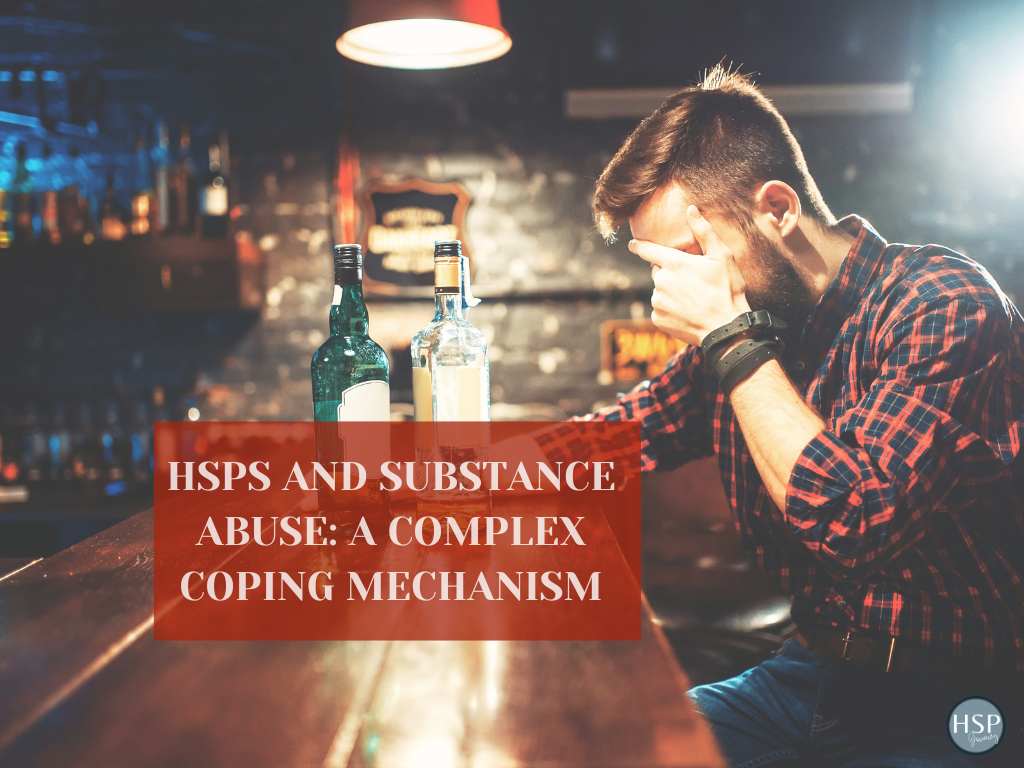Disclaimer: This article is intended for informational purposes only and should not be construed as therapeutic or medical advice. If you suspect that you or someone you know may have a substance abuse problem, we strongly encourage you to seek help from a licensed therapist, counselor, or healthcare professional.
Highly Sensitive People (HSPs) often struggle with managing overstimulation, which can heighten feelings of anxiety and depression. In an effort to cope with emotional overwhelm, some may turn to brain-altering substances, such as alcohol, seeking temporary relief. While this might momentarily dull the intensity of their emotions, it can lead to unintended consequences, including dependency and worsened mental health. This article delves into the reasons HSPs may resort to substances like alcohol, how to identify when substance use becomes a concern, and practical, healthier alternatives for managing overwhelm.

Table of Contents
Understanding Overstimulation in HSPs and Substance Abuse
HSPs are uniquely attuned to physical and emotional stimuli, making them more sensitive to environmental factors like loud noises, bright lights, and stressful situations. This heightened responsiveness can result in overstimulation, where the nervous system becomes overwhelmed by sensory input. Dr. Elaine Aron, a pioneer in the study of high sensitivity, describes this phenomenon through the concept of “Ease of Excitation (EOE),” which measures how quickly an HSP becomes overstimulated (Aron, 1996). Those with higher sensitivity levels are more likely to seek out ways to escape this state, often turning to substances like alcohol, which temporarily alter brain chemistry and offer a sense of relief.
Why HSPs May Turn to Brain-Altering Substances
For Highly Sensitive People (HSPs), substances such as alcohol often serve as a means to calm their perpetually overstimulated nervous systems. As a depressant, alcohol works by temporarily reducing the intensity of emotions and anxiety. This tendency can be particularly prevalent among HSP men, who may use alcohol as a socially accepted way to handle stress. Societal norms surrounding masculinity, which often discourage open emotional expression, can further reinforce this behavior. As a result, some HSP men may feel pressured to rely on alcohol instead of seeking healthier methods for expressing their emotions.
Social Anxiety’s Role in Substance Use Among HSPs
Social anxiety is another major factor that can lead HSPs to consume alcohol. Due to their heightened sensitivity, many HSPs feel overwhelmed in social settings, absorbing subtle emotional cues and dynamics that others might overlook. Alcohol is frequently used as a social aid, helping HSPs feel more at ease and engage with others without becoming overwhelmed. However, while alcohol may provide short-term relief, it can also lead to a dependence on drinking as a crutch for social interaction, potentially worsening anxiety in situations where alcohol is not present.
Identifying Problematic Alcohol Use in HSPs
It’s essential for HSPs to recognize when their alcohol consumption shifts from occasional drinking to a more problematic pattern. Warning signs may include drinking more frequently, relying on alcohol as the primary method for managing stress, and struggling to control intake. Despite its widespread social acceptability, alcohol can pose particular risks for HSPs, as their deep emotional processing may make them more susceptible to dependency. Studies suggest that individuals who use alcohol to manage social anxiety are at an increased risk of developing alcohol-related issues (Kassel et al., 2003).

Looking for an HSP-Trained coach to help you align your life with your priorities?
Through my Highly Sensitive Person (HSP) certification with the Nickerson Institute, as well as being an HSP, I offer HSP coaching to develop specific goals around your HSP needs. We HSPs frequently deal with anxiety and overstimulated nervous systems that prevent us from achieving peace and attaining our life goals. HSP coaching with me includes a detailed review of your sensitivities and a mutually-desired plan for growth and management of this superpower to shift negativity and begin seeing yourself as the hero of your own story. (Affordable monthly coaching begins at $150/month.)
Subtle Warning Signs to Monitor with HSPs and Substance Abuse
Beyond obvious indicators like blackouts or neglecting responsibilities, HSPs should watch for more nuanced signs of a problematic relationship with alcohol. These include using alcohol to manage emotions, avoiding social events that don’t involve drinking, and experiencing heightened feelings of anxiety or depression during periods of sobriety. Given their natural predisposition toward emotional intensity, HSPs may not immediately realize when alcohol is amplifying their struggles.

Healthier Coping Strategies for HSPs
For HSPs seeking alternatives to substance use, there are numerous healthier ways to manage overwhelm:
- Mindfulness and Meditation: These practices help HSPs stay grounded and alleviate anxiety without the need for substances.
- Exercise and Physical Activity: Engaging in physical activity releases endorphins, which can improve mood and reduce stress.
- Journaling and Creative Outlets: Writing, art, and other forms of self-expression can provide a productive way to process emotions.
- Building a Support System: Cultivating close, supportive relationships with trusted individuals can help HSPs navigate emotional challenges.
- Therapy and Counseling: Techniques like cognitive-behavioral therapy (CBT) can equip HSPs with healthier tools for managing stress and anxiety.
Are HSPs More Prone to Addiction?
There is ongoing debate about whether HSPs are inherently more susceptible to addiction. While their emotional depth and sensitivity might increase their risk, addiction often stems more from the coping mechanisms chosen rather than any inherent personality trait. The encouraging news is that resilience and effective stress management skills can be developed. Techniques like neurofeedback, mindfulness-based stress reduction (MBSR), and other brain-training methods can help HSPs strengthen their emotional regulation and improve their ability to handle stress (Masten, 2001).
Looking for HSP Tools to Thrive in a Chaotic World?
The modern world is often overwhelming and stressful for those of us with sensitive nervous systems. Many of us have suffered from the challenges of high stress, anxiety, sensory overload, and mental health and physical health issues. Fortunately, after years of working with and researching Highly Sensitive People (HSPs), Julie Bjelland has developed many tools that have not only helped her but thousands of HSPs all over the world move out of survival mode living and into thriving. In this free webinar, she’ll share the tools that HSPs have found the most life-changing. Her goal is to help you live to your fullest potential because the world needs you.
Join this free webinar and get tools to help you thrive as an HSP!
The Need for Research and Targeted Interventions
As HSPs gain greater awareness of their sensitivity, it’s critical to explore healthier approaches to managing emotional overwhelm without resorting to substances. Although alcohol and similar substances might offer short-term relief, they often come with long-term consequences, including dependency and worsening anxiety. More research is needed to create tailored therapeutic interventions specifically addressing the unique challenges HSPs face with substance use and addiction.
By cultivating resilience, fostering self-awareness, and adopting healthier coping mechanisms, HSPs can effectively navigate their sensitivity without relying on substances, thereby improving both their emotional well-being and overall quality of life.
References:
– Aron, E. N. (1996). The Highly Sensitive Person: How to Thrive When the World Overwhelms You. Broadway Books.
– Masten, A. S. (2001). Ordinary Magic: Resilience Processes in Development. American Psychologist.
– Kassel, R. M., et al. (2003). The Effects of Alcohol Use to Cope with Social Anxiety.” Journal of Anxiety Disorders.
Original article published at https://www.thesensitiveman.com/blog/the-sensitive-man-coping-with-overstimulation-as-an-hsp-misuse-of-substances-to-alter-brain-state. Repurposed with permission.
Be sensitive, be free
*This post contains affiliate links and I will be compensated if you make a purchase after clicking on my links*





[…] Aim not to give into cravings to eat too much junk, alcohol, or other foods that can easily become coping mechanisms, but ask what your body needs. Have I had enough protein today? Do I need water? Do I need fruit? […]